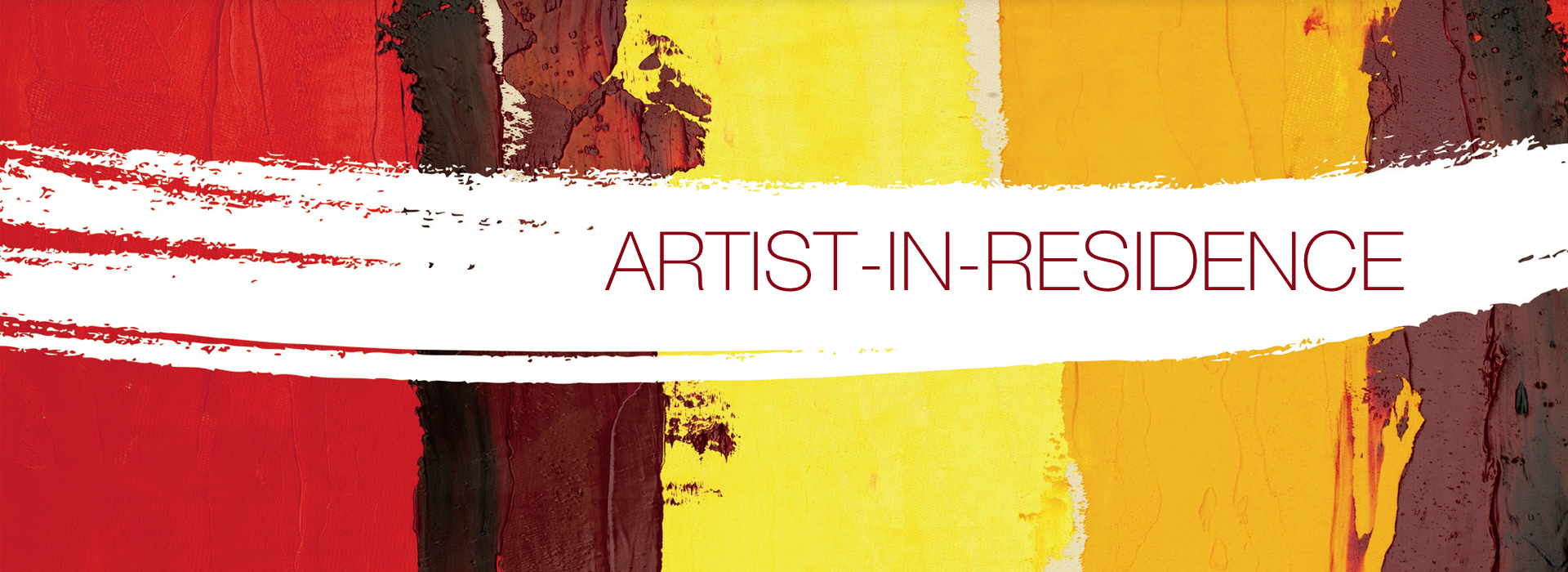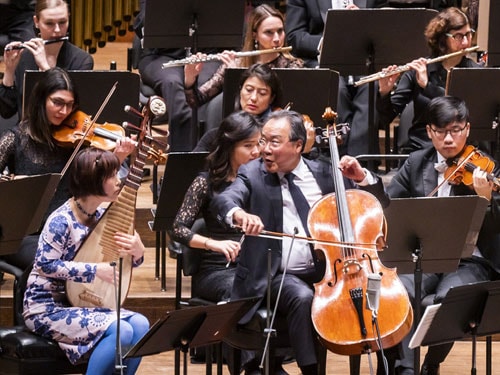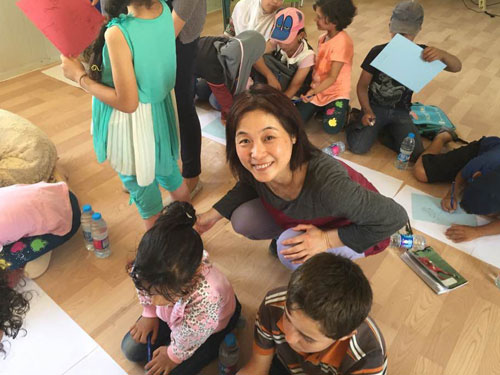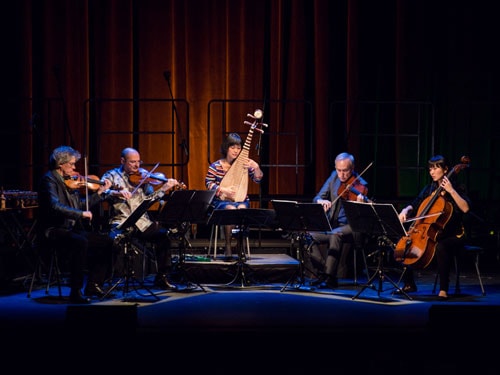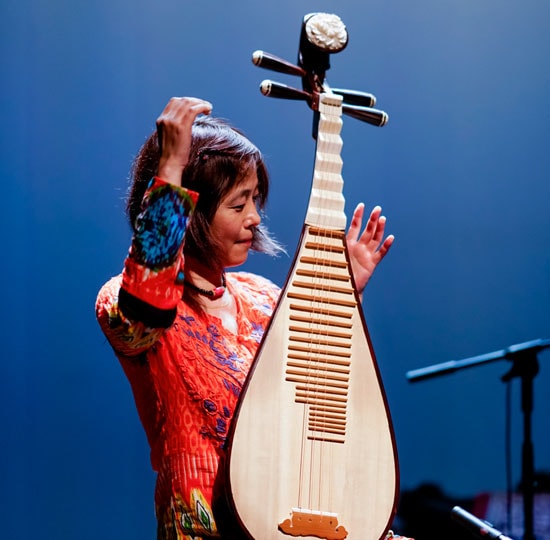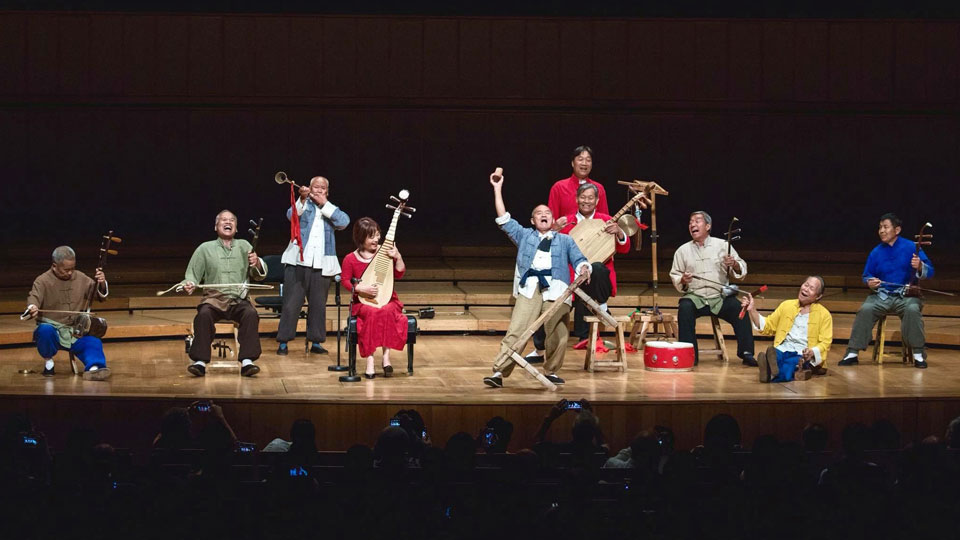I'm not the first Chinese musician to live abroad, but I'm the first person who introduced Chinese traditional music to the world's stage and brought Chinese music in a new era. Pipa went from its anonymous status as a Chinese instrument to being played on the global stages. As a Chinese musician, I became recognized and respected by audiences around the world, and my secret is "determination."
Life is Highs and Lows
Every time I'm interviewed, people liked to ask me,"You've lived abroad for almost 30 years, what kind of bittersweet stories you have for us?" I always dreaded questions like this. It doesn't matter where you live, people's lives are always a mix of highs and lows.
I want to say that music is a profession that's filled with love, hate, hardship, as well as joy. It's incredibly hard to be a musician. I once said it's even harder being a woman as well as a full-time musician. You have to travel for work, and take care of the family at the same time. It's a sacrifice to your role as a daughter, a wife, a mother, and a part of your family. You have to make your own way in the male-dominated music profession." Performing an instrument is a competitive physical exercise as well as intense mental work. You have to be passionate about it and stay determined. You have to have talent as well as be able to stand the loneliness. When others have succeeded, you still have to keep working painstakingly. Sometimes, even being determined doesn't mean you could reach your goal, and that's the life of a musician.
Looking for My Role
Twenty-nine years ago, when I graduated from the Central Conservatory of Music, I gave up my teaching position and began exploring the world with my pipa. I had a sense of crisis; I wasn't sure I could teach as I am only 22 years old. I had to look for my own way as a musician.
My experiences in traveling the world have taught me that the responsibility of a contemporary musician is not only playing an instrument, having an expansive artistic vision. Music is about expressing the imagination and creativity of humankind, and I'm trying to be the bridge. From the simple bridge of the pipa, to different bridges of collaborating with international musicians, we should understand culture and history at all levels, until the day we can have a "cultural overpass" for everyone.
Art Has No Boundaries
My music is neither exclusively East nor West. I've always been curious about things since my childhood, and a crazy imagination pushes me to keep creating. My music touches on a lot of areas. I've worked with international composers on chamber music, ensembles, and concertos, and played over 100 pieces composed for the pipa, including with the Chicago Symphony Orchestra, the New York Philharmonic, the German NDR Symphony Orchestra, the Moscow Solo Orchestra, Yo-Yo Ma and The Silk Road Ensemble, the Kronos Quartet, and all kinds of classical and modern groups.
At the same time, I also played jazz, electronic music, experimental music, and modern dance music. I've worked with the innovative Singaporean director Ong Keng Sen, director Chen Shizheng, and Tony Award-winning screenwriter David Henry Hwang on plays, music theatre, and indoor operas, as well as Chinese shadow puppetry, multimedia, and visual arts, and I've worked on director Ang Lee's movie music, etc.
I like to think about the appeal and value of Eastern and Western cultures. My lack of adherence to one particular style has enabled me to learn from all areas, which have changed my attitude toward life, future development, and the way I see the world. Ten years ago, the "Wu Man and Friends" concert series featured a return to the East, by working with traditional musicians from China, Mexico, India, Central Asia, East Asia, the Arab world, Africa, and Europe and Americas, I searched for my Chinese roots. Undoubtedly, my practice on numerous stages has given me an artistic spirit that is subtle and reserved like Eastern culture, which is gentle and deep, as well as confident and generous like the West, and dares to innovate. These life experiences are incredibly valuable to me.
Meant to Return
In 2014, I was fortunate to be invited back to the NCPA Orchestra in the premiere of Pipa Symphony No. 2 composed by ZHAO Jiping, which was a touching work tailored for me to showcase authentic music from my hometown. When the orchestra started playing Jiangnan Pingtan, my mind froze and I became teary-eyed. I felt touched in my soul. It's amazing to hear a young orchestra in China playing my hometown music!
In 2017, I was even luckier to be one of the solo artists on the NCPA Orchestra's North American tour. Under conductor Lü Jia's baton, we presented the Pipa and String Orchestra, composed by American composer Lou Harrison, and as interpreted by Chinese performers. This was so intriguing to the American audience that all the concerts sold out. I was very moved by the orchestra members' passion and dedication to their work during the tour, which showed me a cultural overpass that NCPA is building to the world.
This year, I am honored to be the Artist-in-Residence in 2019/20 season. I heard people asking, "How do Chinese instruments get introduced to the world?" This is a topic worthy to be discussed. No instruments from any country come from a vacuum, they're always evolving and moving. Many Chinese instruments, like pipa, Suona, Huqin, and Yangqin, came from Central Asia, whereas instruments like the Qin, Flute, Sheng, and Zheng have similar versions in other countries. Instruments around the world all revolve around the playing methods of "blowing, pulling, plucking, and tapping," including traditional Western instruments, which influence and help each other. Therefore, traditional Chinese instruments are also international, and they have their own cultural value as well.
The key is, what are the unique features for Chinese traditional instruments? How much cultural value do we have left in our instruments? What is the difference between our instruments and other countries' instruments? If we find the answer, then we could be respected and worth studying. In my view, my residency in NCPA shoulder heavy responsibilities. I find that many young people today do not understand traditional music and are leaving traditional culture behind. We not only need to introduce traditional Chinese music to overseas students and the general public, most importantly we need to teach the next generation of Chinese.
I look forward to demonstrating the profound meaning of traditional Chinese music along with my friends and the NCPA Orchestra in 2019/2020 season. My opening concert as Artist-in-Residence is "Pipa in May: Wu Man and Woodwind Music," part of the May Music Festival at NCPA, and it is a conversation between pipa, suona, sheng and guanzi.
In July, there will be an innovative concert titled "Wu Man: Our World in Song" where we will bring to Beijing audiences the first-ever Chinese pipa Grammy® -nominated "The Best World Music Album" with instruments like pipa, guitar, bass guitar, and percussion. These will be performed for the first time in Beijing. In early spring of 2020, China NCPA Orchestra and I will present two pipa concertos, which I was involved in creation and commission, Vincent Ho's Rejuvenation: A Taoist Journey, and ZHAO Lin's A Happy Excursion, Concerto for Pipa and Cello, which achieved grant success in its U.S. premiere.
I'm very grateful for NCPA's invitation to be the Artist-in-Residence. I look forward to a reunion with the Beijing audience. Hopefully, I can launch a new public discussion on how to introduce traditional Chinese music to the world with different music styles and my own journey.

